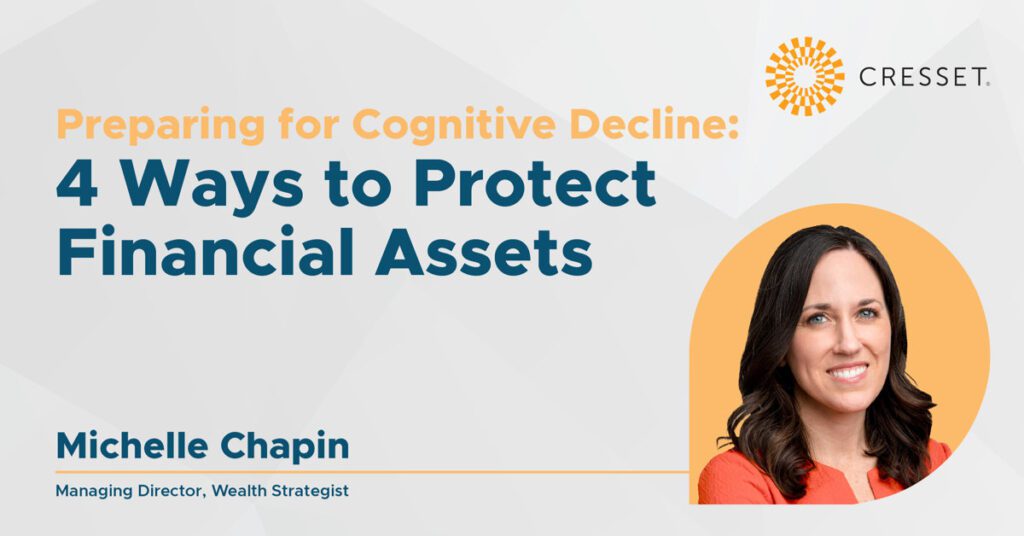
By Michelle Chapin, Managing Director of Wealth Strategy for Cresset
It’s a sad reality for many families. As our loved ones age, their cognitive abilities often start to decline. Unfortunately, the issue is only expected to expand as the population grows older.
It is estimated that 5.8 million people in the United States suffer from Alzheimer’s disease or related dementias. By 2060, the number of Alzheimer’s disease cases is predicted to rise significantly to 14 million people.1
Undoubtedly, this issue is not going away. One of the more unfortunate ramifications of cognitive decline is the inability to manage one’s financial affairs. There is no shortage of tragic tales of once highly capable and successful individuals making questionable investment decisions, falling victim to financial scammers, or otherwise squandering their assets.
Fortunately, there are specific actions that can help protect assets before incapacity sets in. Below are four ways to prepare:
It all starts with a power of attorney
Many of the difficult decisions and heartache that accompanies watching a loved one experience cognitive decline can be avoided if a power of attorney is put in place well before it’s needed. Essentially, a power of attorney provides a trusted loved one with access to and oversight of financial accounts, among other decisions, so the agent (the person named under the power of attorney to help) can see any unusual activities or withdrawals. Recovering lost funds can be nearly impossible after the fact, so vigilance over accounts is key. With a power of attorney in place, if and when the time comes that cognitive decline or incapacity becomes an issue, the agent under the power of attorney can take control and safeguard the financial affairs of the person who can no longer make financial decisions. It’s key to have a power of attorney in place before an individual experiences cognitive impairment, as it requires that person’s consent. Without that, it becomes a legal matter for the courts to decide, which can be expensive, public, and burdensome.
Verbally affirm capacity
During the creation or updating of an estate plan, it’s important for both family members and advisors to definitively affirm that the person for whom the documents are being developed fully understands and agrees with the substance of the documents. Ask, “Have you fully read the documents and do you understand what they entail? Are you entering into this voluntarily?” I strongly encourage families and their financial advisors to ensure that legal counsel is present for the signing of any trust or estate documents. Frequent or unexpected changes in testamentary desires can signify cognitive decline.
Create a communication channel between financial advisors and other family members
Particularly in situations where there might not be a formal power of attorney in place, it’s important to create channels of communication between financial advisors and trusted family members to be used when needed. Often those channels are set up with adult children, allowing for an advisor to check in to verify or authorize any investment or financial decisions that are out of the ordinary or seemingly not in the best interests of the client. Again, this requires explicit voluntary consent among all parties, so it is critical to do this before any incapacity or cognitive decline makes it impossible.
Don’t rush to add a co-owner to financial accounts
If the threat of cognitive decline or incapacity seems to be on the horizon, some families will seek to add an adult child, caregiver, or other trusted family member as a co-owner of financial accounts to help prevent any misguided decisions. While the intent is admirable, the ultimate result can be that the co-owner ends up inheriting all of the assets in the account(s) once the initial owner passes away. That might not reflect the wishes of the original owner, disrupt the estate plan, and cause conflict among the beneficiaries, particularly if there are several people deemed to inherit. As stated above, a better option is usually to set up a power of attorney early on, well before it is needed.
As the statistics above demonstrate, millions of families are impacted by the devastating effects of cognitive decline. Particularly if you have a family history of dementia, it is important to have an estate plan created that names a primary and a successor trusted individual who can assist when needed. Doing so can help protect everyone involved and ensure assets are distributed as intended.
Contact us to further explore how we can help protect your financial wellbeing in the case of incapacity.
1 https://www.cdc.gov/aging/publications/features/Alz-Greater-Risk.html
About Cresset
Cresset is an independent, award-winning multi-family office and private investment firm with more than $235 billion in assets under management and advisement (as of 10/31/2025). Cresset serves the unique needs of entrepreneurs, CEO founders, wealth creators, executives, and partners, as well as high-net-worth and multi-generational families. Our goal is to deliver a new paradigm for wealth management, giving you time to pursue what matters to you most.
https://cressetcapital.com/disclosures/
